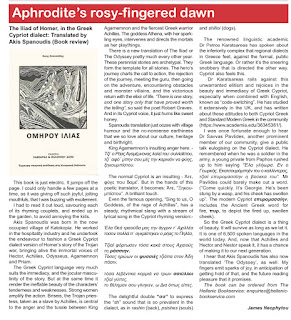Aphrodite’s rosy-fingered dawn
The Iliad of Homer, in the Greek Cypriot dialect: Translated by Akis Spanoudis (Book review)
This book is just electric. It jumps off the page. I could only handle a few pages at a time, as it was giving off such joyful, jolting mouthfuls, that I was buzzing with excitement.
I had to read it out loud, savouring each of its rhyming couplets, and ended up in the garden, to avoid annoying the kids.
Akis Spanoudis was born in the now occupied village of Katokopia. He worked in the hospitality industry and he undertook the endeavour to fashion a Greek Cypriot dialect version of Homer’s story of the Trojan war, bringing alive the immortal voices of Hector, Achilles, Odysseus, Agamemnon and Priam.
The Greek Cypriot language very much suits the immediacy, and the jocular masculinity of the story. But at the same time it renders the ineffable beauty of the characters’ tenderness and weaknesses. Strong women amplify the action. Briseis, the Trojan priestess, taken as a slave by Achilles, is central to the anger and the tussle between King Agamemnon and the fiercest Greek warrior Achilles. The goddess Athena, with her sparkling eyes, intervenes and directs the mortals as her playthings.
There is a new translation of The Iliad or The Odyssey pretty much every other year. These perennial stories are archetypal. They form the template for all stories. The hero’s journey charts the call to action, the rejection of the journey, meeting the guru, then going on the adventure, encountering obstacles and monster villains, and the victorious return with the elixir of life. “There is one story, and one story only that have proved worth the telling”, so said the poet Robert Graves. And in its Cypriot voice, it just hums like sweet honey.
Spanoudis translation just oozes with village humour and the no-nonsense earthiness that we so love about our culture, heritage and birthright.
King Agamemnon’s insulting anger here: -
Τζι´ ο Ρήας Αγαμέμνονας λαλεί του: συλλοΐστου,
τζι´ αφό´ μπην σου μές την καρκιάν να φύης, ξηκουμπίστου.
The normal Cypriot it is an insulting - Άτε, φύγε που δαμέ’. But in the hands of this poetic translator, it becomes: Άτε, “Ξηκουμπίστου”. A brilliant touch.
Even the famous opening, “Sing to us, O Goddess, of the rage of Achilles”, has a steady, rhythmical slang with a stream of lyrical song in the Cypriot rhyming version:-
Έλα Θεά τραούδα μας την άγγριν τ´ Αχιλλέα
τοσον πολλά π´ αγκρίστηκεν ο ρήας το Πηλέα,
Τζιαί φόρτωσεν τόσα κακά στους Αχαιούς τη ράσσιην.
Τόσες ηρώων οι ψυσσιές τζιάπα στον Άδη πάσιν,
τόσα λεβέντικα κορμιά να τρων σσιύλλοι τζιαί γύπες,
το θέλημαν σου γίνηκεν, ω Δια όπως είπες.
The delightful double “σσ” to express the “sh” sound that is so prevalent in the dialect, as in rashin (back), psishes (souls) and shilloi (dogs).
The renowned linguistic academic Dr Petros Karatsareas has spoken about the inferiority complex that regional dialects in Greece feel, against the formal, public Greek language. Or rather it’s the sneering snobbery that is directed the other way. Cypriot also feels this. Dr Karatsareas rails against this unwarranted elitism and rejoices in the beauty and immediacy of Greek Cypriot, especially when combined with English, known as “code-switching”. He has studied it extensively in the UK, and has written about these attitudes to both Cypriot Greek and Standard Modern Greek in the community (https://www.academia.edu/36345381/).
I was once fortunate enough to hear Dr Savvas Pavlides, another prominent member of our community, give a public talk eulogising on the Cypriot dialect. He remembered when he was a soldier in the army, a young private from Paphos rushed up to him saying “Έλα γλήωρα. Εν ο Γεωρκής. Εκατσουρόμπηέν του ο καλλίντερος,τζιαί επυρομασσίην η βούκκα του”. Mr Pavlides could barely make out a word. (“Come quickly. It’s Georgie. He’s been stung by a wasp, and his cheek has swollen up”. The modern Cypriot επυρομασσίην, includes the Ancient Greek word for fire, πυρ, to depict the fired up, swollen cheek).
So the Greek Cypriot dialect is a thing of beauty. It will survive as long as we let it. It is one of 6,500 spoken languages in the world today. And, now that Achilles and Hector and Nestor speak it, it has a chance of making it to our next generation.
I hear that Akis Spanoudis has also now translated ‘The Odyssey’, as well. My fingers emit sparks of joy, in anticipation of getting hold of that, and the future reading pleasure that it promises.
The book can be ordered from The Hellenic Bookservice: enquiries@hellenicbookservice.com
James Neophytou



Comments